Peter MALONE
Saturday, 18 September 2021 19:22
Darwin, Australia's Greatest Shame

DARWIN, AUSTRALIA'S GREATEST SHAME
Australia, 1986, 100 minutes, Colour.
Directed by Paul Drane.
Darwin, Australia's, Greatest Shame, is a docudrama reminding Australians of the history of the Japanese attacks on Darwin in February 1942. The screenplay makes the point that information regarding the attacks was not available during the time nor in the decades afterwards. It was considered at the time by politicians that Australians would not be able to cope with the behaviour of people under attack in Darwin, especially the cowardice exercise by some of the armed forces and the disgraceful behaviour of many of the military police.
The film is interesting as a documentary. John Stanton does the narration. There is a touch of lecturing and hectoring, easy to do in hindsight. However, there are dramatisations as well as insertions of newsreel footage of the time and interviews with survivors of the attack. The interviews with the survivors are excellent, mainly men, who reminisce with great attention to detail, about what happened to them at the time, the experience of the armed forces, the general population, the role of the police. One woman remembers the evacuation.
In listening to the interviewees, one can build up the chain of events in the middle of February 1942. There was no preparation for such an attack. Many ships were in Darwin harbour, flights had been sent out for reconnaissance - and the Japanese squad was mistaken for some of these planes returning. Father John McGrath?, the missionary on Bathurst Island, radioed in the news that planes were on their way. While this was received in Darwin, the RAAF authorities were hesitant and did not warn the population.
When the bombing started, the destruction of the ships was horrendous. Many more people lost their lives than was stated officially. There was panic, people started to evacuate the city. While the police tried to create order, the military police, often drunk, ruled the city as they wished, often looting. The one train that left Darwin was not completely full. In the meantime authorities, the RAAF, gave ambiguous orders with the result that the men started to leave Darwin, some going as far as Adelaide River - and many even further. The administrator of Darwin also showed poor judgment, wanting to save crockery and cutlery at Government House rather than save people.
The film's screenplay makes much of an aboriginal servant girl buried under the rubble who was left for dead - the authority considering that she was dead, the police and other officials considering that she was not.
In the docudrama, the actual raids are reconstructed from a variety of footage. Father McGrath's warning, the reception at the RAAF, the arguments at RAAF headquarters are dramatised. The hearing and investigation into what went on is also dramatised - providing opportunity for flashbacks. The incidents with the administrator of Darwin are also dramatised, as are the shameful episodes with the military police.
The film has a very judgmental tone, especially in John Stanton's comments. However, the cumulative effect of the interviews and the reconstructions balances this out and leaves open the questions of heroism and cowardice. It highlights Australia's inexperience in facing the realities of war.
The film's structure guides the audience through the stages. They are:
1. The attack on Darwin: background information, the Japanese squadrons, their flight path, their destruction.
2. The initial behaviour of the people, the shock, the dropping of the bombs and the mutilation, deaths, heroism in people trying to help? The missionaries, the RAAF?
3. The focus on the RAAF and its response to Fr McGrath's warnings, the evidence given of the various officials as to what happened? The ambiguous orders - and the scattering of troops from Darwin.
4. The episodes with the military police, their authority, their personal styles, the looting - and the consequences for people who were robbed? The views of the civil police? The train leaving Darwin?
5. The army, its having to cope, again not doing well in the situation, scattering.
6. The role of the authorities, the civil authorities, Abbott and his reputation in Darwin, his behaviour after the bombing, getting his wife on the train to Alice Springs, calling on favours from other officials, ordering the police to save the crockery and cutlery. Also the episode with the young aboriginal girl and her death is recorded and reconstructed.
7. The film ends with the focus on the heroism that could be found in Darwin at the time, the mutual help, the superhuman attempts for people to save others, the attempts of people to maintain some semblance of law and order.
This film is not the final word on the attack on Darwin. However, made in the '80s and shown on the Seven Network, it was an opportunity for audiences to understand something of what had happened 50 years earlier.
The film also offers an opportunity for a number of veteran Australian actors to take part in the reconstruction of events. This adds to their dramatic strength and persuasiveness.
Published in Movie Reviews
Published in
Movie Reviews
Tagged under
Saturday, 18 September 2021 19:22
Darling, Let's Kill the Neighbours

DARLING, LET'S KILL THE NEIGHBOURS
US, 1990, 100 minutes, Colour.
Teri Garr, Robert Urich, Alex Rocco, Susan Ruttan, Jeffrey Tambor.
Directed by Anson Williams.
Darling, Let's Kill the Neighbours (or originally A Quiet Little Neighbourhood; a Perfect Little Murder) is a piece of entertaining fluff, a shot at yuppy types and suburban styles, a shot at activists who let their imagination run riot. It is a murder mystery, more entertaining in the possibilities than in the solution, which is rather flat. Teri Garr enjoys herself as an activist housewife who hears conversations on a device for looking after her children - and gets conversations from cellular phones. Alex Rocco as the police investigator won't believe her, her husband Robert Urich gets exasperated. She pursues neighbours with various hypotheses until the murderer is finally revealed. An entertaining, light time-passer.
1. Entertaining comedy, parody of life in the suburbs? Murder mystery - sufficient clues, characters, resolution?
2. The portrayal of the suburbs and their tackiness, conformity - the houses all looking the same, Cynthia and her industry, the yuppy devices?
3. The title - and the alternate title?
4. The focus on Marsha and Roscoe, their farewell, promising not to adapt to suburban life? Marsha's activist background? Their arrival, not knowing which house? Settling in, Cynthia's visit and recruitment, not going? Their attitude towards the neighbours? Roscoe and his animal research and neighbours' antagonism? The new way of life - especially for Marsha learning to stay at home and look after the family?
5. The device for communication, it picking up the cellular phone conversation? The satire on soap operas - and everybody thinking the conversation was soap-operatic, the wives watching the soap operas, the excerpts shown during the film, the addictive enticement of the soap operas? The film parodying the soap operas?
6. Marsha and her discussions with Roscoe, his disbelief? The information, taking it to Inspector Locke, his politeness but disbelief? Her taping the conversations; their being not sufficient evidence? Her continued pursuit of the police with her hypotheses? The imminent murder, her following the characters around the town and getting confused? The continued steps of the plot being revealed over the cellular phone and Marsha hearing them?
7. The possible culprits and the play with the names of Judy and Don? (And their being in different soap operas?) Judy and Don and their tense marriage, Judy addicted to soap operas, Don as a doctor? Judy under suspicion, going to the hospital to take the pills? Her driving around? Don and his friendship with Roscoe, Marsha going to the hospital, wanting the check-up? Judy and Hank, Judy staying at home while pretending she was an executive, Hank being the beefcake soap opera type man - yet being the home carer and cooker? Cynthia and Don - Cynthia and her industry, Don and his ageing? (And the humour about Cynthia's hearing that Don was a sexpot - and the aftermath?)
8. The complications, the information on the phone, Marsha's hypotheses and following people around, challenging them, getting the wives together - and the revelation that Judy wanted to kill herself? The soap opera twist with collecting the blackmail money? The irony that it actually worked?
9. Roscoe, his exasperation, pleading with Marsha, getting rid of the talking head? Her taking it back? His moving out? His finally coming - and rescuing her?
10. The culprits - the motivation, Don and his attack on Marsha? The truth about the money and his wife's going to study? Judy - and her not wanting to go through with the plot and Marsha wanting her to be let off? Inspector Locke - finally believing everything?
11. The popular ingredients of the murder mystery inserted into contemporary suburbia with the spoof on soap operas?
Published in Movie Reviews
Published in
Movie Reviews
Tagged under
Saturday, 18 September 2021 19:22
Dark Room, The
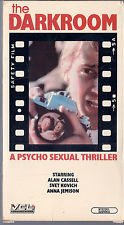
THE DARK ROOM
Australia, 1981, 100 minutes, Colour.
Allen Cassell, Anna Jemison, Rowena Wallace.
Directed by Paul Harmon.
The Dark Room is a Sydney-based psychological drama. It has thriller overtones, but focuses on the relationship between a disturbed son and his father. Alan Cassell is good as the father, estranged from his wife, Diana Davidson, having an affair with a younger woman, Anna Jemeson. His son eavesdrops on him, makes the acquaintance of the lover, becomes infatuated with her and finally brings a confrontation between all three - with an apocalyptic house-burning ending.
The acting of the principals is good except for Sevet Kovich, who gives a very mannered performance as the son. Some of the dialogue is trite - nevertheless, it is quite an entertaining drama for popular audiences.
1. Dramatic thriller? Family relationships? Disturbed personalities?
2. The Sydney settings, the houses, flats, shops? The dark room? The holiday house? The musical score?
3. The title, Michael's photography, the literal dark room, the dark room of his own spirit?
4. Michael, his background, relationship with his mother but not communicating with her, the clashes with his father and his father's expectations? Rebelling and going to art school? The criticism of his weird friends? The implications of homosexuality? His spying on his father and Nicki? The photos? Following Nicki, getting the job at the shop? His work at the shop, his friendship with Nicki, the outings, the discussions, photographing her for her portfolio? The sexual sequence and its failure - and photography? The photos in his dark room? The clash with his father at the party, his godfather, moving out? His own flat, the dark room? The growing infatuation, the confrontation with Nicki? His father's jogging on the beach and talking with him and Michael's rejection? Taking Nicki, the holiday house, the confrontation, the truth? His drinking, exasperation? The gun to his father? The burning house and his death? A credible disturbed young man?
5. Ray, his relationship with his wife, estranged? Lying to her? The relationship with Nicki, the younger woman? The promise of marriage? The holiday house? The party and his wife's birthday, the confrontation with Michael, trying to give him good advice, critical of his friends, wanting him to go to university? The talk on the beach and Michael's rejection? Telling the truth about the affair, the estrangement from his wife, telling Michael? The phone call, the holiday house, the final confrontation? The rescuing of Nicki?
6. Nicki, actress, working in the shop? The relationship with Ray and her hopes for a future, marriage? Meeting Michael, thinking him Steven? The friendship, at work, his concern for her, the photograph portfolio? Meeting her former love and her exasperation at his chauvinism? The visit to the cemetery, getting more irritated with Steven? The failed sexual encounter? The plane flight, Michael abducting her, the discovery of his true name? The confrontation in the house, the rescue? A future with Ray or not?
7. Martha, the estranged wife, not communicating with her son? The birthday party? His leaving home? Ray's concern about his disappearance - a dismal future?
8. The student background, the shop and the personnel, actors, restaurants?
9. The motivation of the characters? Relationships, love and hate? The disturbed personality?
Published in Movie Reviews
Published in
Movie Reviews
Tagged under
Saturday, 18 September 2021 19:22
Dark Past
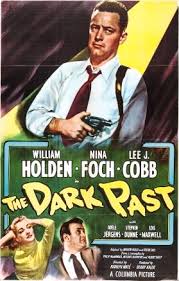
DARK PAST
US, 1948, 75 minutes, Black and white.
William Holden, Lee J. Cobb, Nina Foch, Adele Jergens.
Directed by Rudolph Mate.
The Dark Past is an interesting and entertaining dramatic thriller from the late '40s, a period which explored themes of psychology in the movies. The film was based on the play, a confrontation between an escaped criminal and a psychiatrist.
The film is a star vehicle for William Holden (at age 30). However, it also provides Lee J. Cobb with one of his best performances as the psychiatrist. Nina Foch is also very good as the girlfriend. The film was directed (his second feature film as director) by former cinematographer Rudolph Mate.
While the psychology and the interpretation of dreams might seem somewhat dated now, it is an interesting look at how people viewed psychology, the treatment of criminals, the interpretation of dreams in the early part of the 20th century.
1. An effective short thriller? The tradition of the film noir? The atmosphere of prison and escape? (And films like The Desperate Hours where criminals bail up a family in siege?)
2. Black and white photography, the police precinct, the university, the house? The action taking place overnight? Musical score?
3. The title and its reference to psychological influences on the individual, shedding light on the dark past?
4. The status of psychology before 1950? The early 20th century developments? The police having a police psychiatrist? Professors of psychology? Book writing and reviews? The hopes for psychology as helping people to rehabilitation? Popular wariness and non-understanding of psychology? The public taking tough attitudes towards criminals? The importance of therapy, dream interpretation?
5. Lee J. Cobb and his screen presence as the doctor? The opening with his describing his day, psychology, interpreting the faces in the bus, arriving at work, going to the criminal line-up, his interest in the young thug, his discussion with the officer? The flashback?
6. The doctor and his interests, his lecturing, relationship with his family, his colleague, the mending of the gun, the plan for fishing and hunting, at home, the guests and their tension? Al Walker and the intrusion? His keeping his cool, not getting upset, wanting to review the book, noting Walker's interest in the book and its theme, the discussion with the girlfriend, her recounting of the dream? The colleague with the gun and the shooting? The visit of the police and his cover-up, the phone call about the time? Giving opportunities for Walker to talk, the interpretation of the dream, making him tell the truth, uncovering the past, the confrontation? Walker unable to shoot the policeman? 1940s psychology?
7. William Holden as Al Walker, the breakout, in the car, accomplices, the callous killing of the warden? The decision to stay at the professor's home? The intrusion, his stances, violence? Saying things that he did not understand were screwy and screwball? The paralysis in his hands? His interest in the book and its themes, his worry? Playing chess and the discussions about chess? Wanting to sleep but unable? The recurring dream? His wariness with the psychiatrist but his wanting help, agreeing to the interpretation, having to tell the truth, his mother, his father, the incident? Betraying his father, hating him, wanting to kill him? His own flashback about the incident? The final confrontation, his not being able to shoot the police? How effective a transformation, cure?
8. The visualising of the dream sequence, in negative form, the rain, umbrella, the hole, Al trying to keep the rain out with his fingers? The contrast with his own flashback and the realism of the incident with the table, the blood? The Oedipal background of his jealousy of his father, killing him, relationship with his mother? The psychiatrist as a substitute father?
9. The professor's wife, her support, handling the situation, the young boy, his trying to escape and warn the police? The guests, the wife's affair, the clash and tension? The bitterness of the businessman? Trying to buy off the criminal? The girlfriend and her confrontation of the wife and moral standards?
10. The maid and the cook, tied up in the cellar, the cook and her assertiveness, escape?
11. The girlfriend, support of Al, love for him, concerned about his sleep, upset when he rejected her, her confronting the maid and the cook? The other criminals and their behaviour?
12. The associate professor, the gun, his arrival, shrewdness, being shot? Satisfaction when the criminal was hit over the head with the poker?
13. An effective thriller, opening out of a play? Police investigation, psychological study, the family as hostage? The optimism of the ending?
Published in Movie Reviews
Published in
Movie Reviews
Tagged under
Saturday, 18 September 2021 19:22
Dark Journey
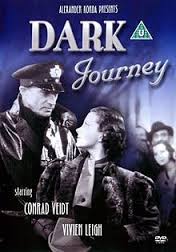
DARK JOURNEY
UK, 1937, 82 minutes, Black and white.
Conrad Veidt, Vivien Leigh, Joan Gardner, Anthony Bushell, Ursula Jeans, Eliot Makeham, Austin Trevor, Edmund Willard.
Directed by Victor Saville.
Dark Journey is a brief espionage story from the late '30s - anticipating the espionage stories that were to come during World War Two. Vivien Leigh is attractive as the heroine and Conrad Veidt is sinister as the German spy.
The film is contrived, has a small budget - but manages to keep audience interest in the clash between the hero and the heroine. The film was directed by Victor Saville, who was to move to Hollywood and direct a number of thrillers, including some versions of Mickey Spillane's stories.
1. Interesting British thriller? Espionage of World War One? Antagonism towards the Nazis? Preparation for World War Two?
2. British production, black and white photography, sets? Musical score by Richard Addinsell? Songs?
3. The title, reference to Madeleine and her espionage work?
4. World War One, travel on the continent, submarines in the North Sea, ships? Swiss citizens? The role of Sweden? French and German spies? The British spies?
5. Madeleine, her Swiss background, her travelling, her dresses, her shop in Sweden? The dresses and their codes? Her front in the shop? The squabbles between her saleswomen? Her customers? Karl and his visits, infatuation? Buying all the dresses? Courting her? The clash at the cafe with his trick response to women? Her going out with him? Under suspicion? The wrong information? The death of Anatole? Her having to go back to France, the arrest? Her being presented with the French medal? Going back to Sweden, finding out Karl's identity, his knowing hers? The bond between the two? Bob arranging her escape, the arrest in the shop, the sentence of deportation, on the boat? Being taken by the Germans, rescued by the British? British heroine?
6. Karl and his cover, his being expelled from Germany, his playboy life in Sweden? Socialising, the women, his attentions to Madeleine? Buying the dresses? Germans spurning him? The truth about his identity, the revelation to Madeleine, his knowing who she was? His tracking the boat, the capture of Madeleine, the sea rescue, his being sent back to Germany?
7. The presentation of British Intelligence, espionage and information, the communication of information? French Intelligence? German Intelligence?
8. Life in Sweden, socialising, shops? The atmosphere of the war in a neutral country? The police?
9. Popular ingredients, an early example of the espionage story, the influence on World War Two spy stories?
Published in Movie Reviews
Published in
Movie Reviews
Tagged under
Saturday, 18 September 2021 19:22
Dark Angel
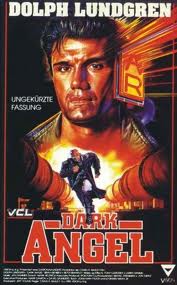
DARK ANGEL
US, 1990, 93 minutes, Colour.
Dolph Lundgren, Betsy Brantley.
Directed by Craig R.Baxley.
Dark Angel is a violent police thriller, aliens invading Earth, an action movie designed for Dolph Lundgren. Lundgren came to prominence in Rocky IV, confronting Sylvester Stallone. In the following years he followed in the footsteps of Chuck Norris and other musclebound heroes with such thrillers as Scorpion, The Punisher.
This film is somewhat tongue-in-cheek - although it takes itself very seriously. Lundgren is a police officer, there are drug deals, special effect aliens, violent confrontations.
1. Interesting and entertaining thriller? Police thriller, drug deals? The alien theme - the superhuman aliens and the confrontations?
2. The atmosphere of the American city, the world of crime, darkness, violence? Police investigations?
3. The impact of the special effects, the stunt work?
4. The introduction of the alien theme, the car, explosions? The pursuit of the aliens: good and bad? Reasons and motivations? The violent deaths - with the disc? The importance of the fluids? The variety of confrontations, chase and destruction?
5. The '80s and drug deals, the dealers, wealthy businessmen, thugs? Their deaths? The partner, the pursuit?
6. Caine, his help, the deaths, the investigations, the rules, the authority figures and their commands? Diane? The assistant, the FBI, his not being used to the violent methods? His learning experience? The disc deaths? The drugs, the dangers? The aliens, the pursuit, the deaths? The final heroism?
7. The assistant, his FBI background, his sharing with Caine, learning, becoming tough?
8. Diane, relationship with Caine, police work, involvement, the pursuit?
9. The portrait of the police, authority figures, the ordinary police? The criminals, their background, violence?
10. The plausibility and implausibility of the plot? Audience familiarity with the police movie? The popularity of alien and predator themes in the '80s? The violent stances - and the gung-ho attitude towards crime and criminals?
Published in Movie Reviews
Published in
Movie Reviews
Tagged under
Saturday, 18 September 2021 19:22
Dark, The
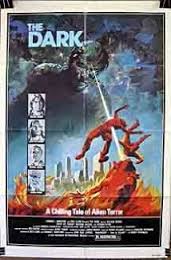
THE DARK
US, 1979, 92 minutes, Colour.
William Devane, Cathy Lee Crosby, Vivian Blaine, Richard Jaeckel, Keenan Wynn.
Directed by John Cardos.
The Dark is a piece of late '70s science fiction blended with police investigation and media treatment. This kind of theme became much more popular during the '80s with such films as The Hidden (also with an alien coming to Earth and becoming a serial killer) and such thrillers as Shocker.
The film is conventional enough - aliens coming to Earth, interacting with humans, violent deaths, the alien absorbing human energies; there is the expected police investigation and failure; there is the glamorous newsreader who is on to an exclusive.
William Devane stars as a former policeman on bad times whose daughter is murdered and who tries to investigate. Cathy Lee Crosby is the ambitious TV journalist. The supporting cast includes Keenan Wynn as the station head, Richard Jaeckel as the police investigator. Vivian Blaine guest stars as a hostess.
The film uses its special effects whenever the monster appears - not so often, but for murderous purposes.
1. Entertaining thriller? Science fiction? Police investigation? The media?
2. The American city, the precincts, the neighbourhoods? The special effects and stunt work? The violent sequences? Thriller impact? Musical score?
3. The title, the atmosphere of the dark, the use of light and darkness, the disguise of the alien as a blind man? The murders at night?
4. The prologue, the information about life in the galaxies? Aliens coming to Earth? Plausibility and implausibility of the plot? The frightened young girl, her pursuer, her death? Setting the tone for the thriller?
5. The police and their investigations, Mooney and his assistant, their sceptical attitudes, doing their best, pressure from the captain, from the media and the antagonism towards Zoe? The meetings, the briefings by the coroner? The interview with the clairvoyant and their scepticism? The continued pursuit, clashes with Warner? The associate and his continued eating? The confrontation with the black youth? The protesters? The final search for the monster, the death of the associate, the killing of the monster?
6. Warner, coming back to the city, his past? The impact of his daughter's death? Looking for his wife? The encounter with the police, with Zoe and his antagonism towards her? The reconciliation, in love with her? His continued pursuit of the case, going to the clairvoyant, looking with Zoe for the young actor who was to be victim? The final confrontation?
7. Zoe, her work at the station, relationship with Sherman, her ambitions, reading the news, the exclusive, her reporting? Collaboration with the police? Sherman and his frightening her in the garage - and his own fright? Her connection with Warner, following the case through, searching for the victim?
8. The clairvoyant, on the boat, the young actor, her vision, seeing the monster, trying to warn the police, their being rude to her, her talking with Warner, the attack of the monster on her?
9. The victims - the young girl, the strong and burly man, the black man with the prostitute (and her later testimony, on TV)? The actor and his selfishness, his dream, brutality towards his girlfriend, the car chase and his death?
10. The atmosphere in the city, the potential for panic? The responsibility and role of media? Police information, investigations, mayors and pressure? The background of society in the city, the gang and their protests, the affluent and their boat parties?
11. The monster, the blind man, the eyes and the power for fire? The brutal killings? Being engulfed in flame?
Published in Movie Reviews
Published in
Movie Reviews
Tagged under
Saturday, 18 September 2021 19:22
Dracula/ 1931
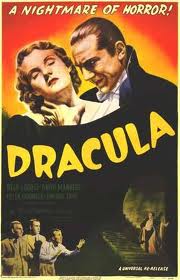
DRACULA
US, 1931, 84 minutes, Black and white.
Bela Lugosi, Helen Chandler, David Manners, Dwight Frye, Edward Van Sloan.
Directed by Tod Browning.
Dracula is Tod Browning's classic of the early '30s. Universal Studios began to make horror films like this (also Boris Karloff in Frankenstein) and began a tradition in the '30s which was much imitated.
There had been previous vampire films including the German Nosferatu. However, this film became the norm for Hollywood presentation of Dracula and vampires. The film was remade many times by Hammer Studios with Christopher Lee and Peter Cushing. Jack Palance was also Dracula, as was Frank Langella in an ambitious production with Laurence Olivier as Van Helsing.
Bela Lugosi made his mark as the suave and sinister (with a touch of ironic humour) Dracula. This film is based on a stage play - and this is often evident, especially with much of the horror happening off screen.
The film is fairly creaky - but is interesting to look at as a classic.
1. The popularity of vampire stories? The Living Dead? Dracula? The impact of this film?
2. The production of the early '30s, black and white photography, sets and editing? Musical score? Acting style?
3. Adaptation of a stage play? Atmosphere and special effects? The horror off screen? Yet the sense of horror, terror, menace?
4. Audience knowledge of vampires, Dracula? Explanations? The traditions? The destruction of the vampire?
5. The introduction with Renfield, the atmosphere of Transylvania? The villagers and their fright at the inn? Midnight, the mountains? The coachmen, the bat? The encounter with Dracula, Renfield's fate? The blood, the wine? In the asylum? Eating the insects? Serving Dracula? Destroyed by him?
6. Bela Lugosi and his appearance, manner and style? The bat and the wolf? In the night, the welcome, the atmosphere of the castle? The meal with Renfield, looking at the blood? Travelling to England? The gentleman in London? The theatre, attracted to Mena? Discussions with Seward? Taking Lucy and making her a vampire? Travelling to Carfax? The deaths? His hovering over Mena, the sexual and violent impulses? Discussions with Seward, clash with Van Helsing? Not appearing in the mirror and smashing it? His return to the castle? His death?
7. Mena as the heroine, attracted to Dracula, relationship with John? With her father? The visits of the vampire, caught up in his spell, surrounded by his cloak? Sexual and violent suggestions? Her not being vampyrised? Dracula's death and her experiencing it, her freedom?
8. Lucy, the attraction, Dracula transforming her? The woman in white and the killing of the children?
9. Dr Seward and his asylum, the supervision of Renfield? Concern about Mena? The knowledge about vampires? The assistants in the asylum, the servants and their reactions?
10. Van Helsing and his reputation? The vampire hunter? No image in the mirror? Going with John, the destruction of Dracula?
11. John as hero, love for Mena, his pursuing her, calling out to her? Trying to save her? The final pursuit in the castle?
12. How well did the film work as a ghost story? The evil dead? Its influence on later films?
Published in Movie Reviews
Published in
Movie Reviews
Tagged under
Saturday, 18 September 2021 19:22
Do You Remember Love?
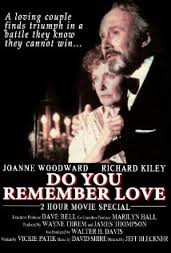
DO YOU REMEMBER LOVE?
US, 1985, 100 minutes, Colour.
Joanne Woodward, Richard Kiley, Geraldine Fitzgerald, Jim Metzler, Susan Ruttan.
Directed by Jeff Bleckner.
Do You Remember Love is an Emmy Award-winning telemovie about Alzheimer's Disease. It is well written and acted - enabling audiences to understand something of the development of the disease, the deterioration of the sufferer, the consequences for those trying to care for the sufferer.
Joanne Woodward gives an Emmy Award-winning performance as Barbara, an eccentric poet-professor, who discovers she has Alzheimer's Disease and deteriorates before the eyes of her family and colleagues. (It is said that Joanne Woodward's mother suffered from the disease.) Richard Kiley is excellent as the supportive, sometimes exasperated and proud, husband. Geraldine Fitzgerald appears as Barbara's mother.
The film takes the opportunity to give some explanations of the disease, describe and dramatise its symptoms, show that there are support groups, but also shows that there is no known cure.
A film worth seeing for the portrayal of themes, for characterisations, for understanding a debilitating illness.
1. The impact of the telemovie, serious, human interest, information? Designed for the wide television audience?
2. The title, Barbara's poetry, her final speech - and the aftermath of her life?
3. Audiences identifying with this American family, American situations? Characters, place, work?
4. Audience knowledge of Alzheimer's disease or not? The explanations given in the film? Symptoms, dementia, behaviour? The information given in the support group, by the doctor?
5. Joanne Woodward as Barbara: her relationship with her husband, her son and daughter-in-law, her mother? The experience of the sabbatical, her joy on returning to work, meeting with friends, discussing with colleagues, the severity of Marvin? Her eccentricity, her poetry? Her eliminating students from classes? Her beginning to forget, going in the wrong direction? The difficult classes, losing the thread of her thought, the students trying to ask questions, her angers, distractions, walking out of class? Her relationship with her mother, her mother's hospitalisation, bringing her home? Her anger with her mother, bringing out past angers?
6. Her going to the nominating party, the possibility of the Longfellow Award? George wary of her behaviour? The introduction to the critic, his unctuous flow of words, her sardonic observations? The psychologist observing her? Recommendation to go to the doctor, the battery of tests? Going to the doctor for the result, his plain telling her of the truth?
7. Barbara and her deterioration, the classes as failures, the staff discussing what to do, giving her leave of absence? Her physically attacking George? Clashes with her mother? Out with her friend in the shopping mall and her rudeness, getting lost in the corridors? Driving the car erratically? The labels in the house to help her? The times when she could joke and laugh with George? The erratic wanting to make love? Going into the pool with the children and being arrested?
8. Her winning the Longfellow prize, the family's support, her wanting to write a speech and finding it so difficult with the typewriter? The family deciding whether she should go? The giving of the award, her going to the rostrum, words failing her, her standing helpless and loving as George read her words? The impact of this finale?
9. The portrait of George as an ordinary citizen, the long years of love for his wife, supporting her, puzzled by her, getting advice, observing her, the psychiatrist observing her, going to the doctor, putting labels on things at home, his growing impatience and his outburst, her attacking him? Yet his wanting to give her his love and support? Not wanting to go to the group, finally going, listening to the discussion, talking about his own feelings? The prize, helping her, making demands on the family, admitting his mistakes in keeping them out?
10. Tom and his relationship with his mother, avoiding her because of the illness, his own fears? His wife giving advice, supporting him? The sketch of Lorraine, strong elderly woman, falling in hospital, the possibilities of going to a home - and the pathos when Barbara went on the tour of the home and saw herself? Her concern about going to a home when she was helpless? Lorraine and the family discussion, present at her daughter's award?
11. The psychiatrist, his friendship and help? The doctor and the tests and the explanations?
12. The university staff, friendship, jealousy of colleagues? The satire on the critic and his commentary on her poetry?
13. The support group meetings, the pathos of the spouses, the helplessness of the sufferers? The black husband and his talk about the diaper for his wife? The wife and her concern about money payments and insurance, bankruptcy? The effect on George?
14. Dramatising the progress of an illness, audience emotional response, receiving information, understanding and learning to cope?
Published in Movie Reviews
Published in
Movie Reviews
Tagged under
Saturday, 18 September 2021 19:22
Down By Law
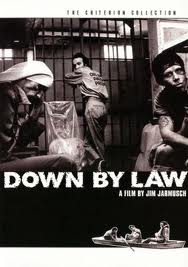
DOWN BY LAW
US, 1986, 107 minutes, Black and White.
Tom Waits, John Lurie, Roberto Benigni, Ellen Barkin, Nicoletta Braschi.
Directed by Jim Jarmusch.
Jim Jarmusch established himself as one of the most successful small-budget writer-directors from the United States of the '80s. His first film, Stranger Than Paradise, was seen world-wide. Down By Law is his second film. He went on to make the bigger budget Mystery Train and Night on Earth, an episodic film with five taxi rides in different cities. Several people collaborated with him in a number of films including John Lurie as actor and musical director, Tom Waits with his songs and Roberto Benigni, the captivating comedian of Down By Law, who was the passenger in the Rome story of Night on Earth and who went on to international fame with his Oscars for La Vita e Bella. His wife, Nicoletta Braschi also appears here.
Jarmusch likes episodic stories where characters interconnect. The setting here is New Orleans (captured most effectively in black and white photography by Robbie Mueller). The opening tracking shot is quite spectacular and the style is used at other stages of the film. The stories of Zack, a radio disc jockey thrown out by his girlfriend, connects with that of Jack, a pimp who has been set up by gangsters in the city. Wandering through is Roberto, Bob, who is an Italian delighted in the discoveries of the English language. When they all end up in jail, they escape with Bob's help, interact with each other and then go on their separate ways. The film is often very amusing in its characterisations as well as in its dialogue. Jarmusch is very effective in setting up offbeat characters and their interactions.
1. The work of Jim Jarmusch, writer-director, low budget, non-Hollywood? His perceptions of the United States and Americans?
2. The quality of the black and white photography, light and dark, shadows? The atmosphere of New Orleans? The musical score, Tom Waits's songs and his performance?
3. The meaning of the title, stooping down, because of the law? The title and the verse?
4. The opening credits and their atmosphere, the long tracking shot, New Orleans and the variety of views? Stopping at the two locations? The setting?
5. Zack, his work, the radio, the initial clash with Laurette, the strength of the fight, throwing things, the shoes? His being sent out? Wandering the streets, driving? The radio deejay ending up in jail?
6. Jack, the conversation with his girlfriend, black and white? Waking up, his relationships? Lifestyle? The pimp? The brittle discussion with his girlfriend? The visitor, the pressure? Fatso and his message? Going to the hotel, the under-age prostitute, the set-up? His being arrested?
7. Jack and the arrest because of the young girl? Zack and the driving of the car, the body in the boot? Going to prison, the process of going into prison, the two in the same cell, ignoring each other, communicating, clashing, fighting, the bond between them? The long cinematic takes, tracking along the cells and the bars? The effect for the audience? In jail, empathy with the characters?
8. The introduction to Roberto? The first glimpse, his English, noting things down? Phrases? His arrival at the prison, talking? Their sleeping and ignoring him? Their curiosity? His talking, his phrase book, getting names mixed up? His personality and style? The Italian background? Jack and Zack denying what they were charged with? His calmly announcing his crime, the killing and the cheating? His bunk, the hiccups, the smoking...?
9. Bob's genial mood, changing Jack and Zack, the bonds between them? Jack getting Zack to do his radio routine and the weather? Bob and their variations on `I scream for ice cream'? The close-ups of Bob, his love for Walt Whitman, Bob Frost?
10. The escape: the idea, the plan, drawing the window? It being easy to get out? The audience memories of prison escape films - especially in the South? The chases, the swamps and the bayous, getting tired, on the run, the water, not being able to swim? Canoeing? Walking? Hungry? The rabbit and eating it, anger, separation?
11. Walking along the road, Luigi's Tin Top? Nicoletta and her place there? Bob going in, the others waiting, the sharing? Nicoletta's story, their eating, sleeping, dancing to the record? Clothes and the food - and the farewell?
12. Bob and his new life, `Wish you were here'? Jack and Zack at the crossroads - and the different directions?
13. The range of portraits, types, the focus on men (and women)? Foibles, eccentricities, good and evil? Relationships? Comic insights?
Published in Movie Reviews
Published in
Movie Reviews
Tagged under